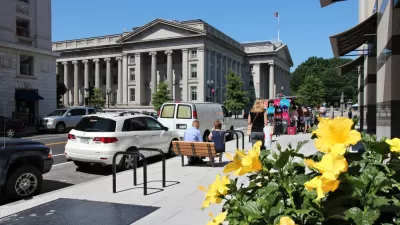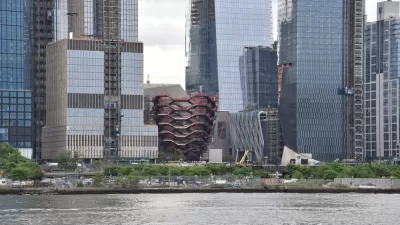Mobile broadband, government-sponsored cloud computing, smart devices - these are a few of the technologies that cities should be thinking about for the future, says the Institute for the Future in a new report.
Greg Lindsay of Fast Company looks at the Rockefeller Foundation-sponsored report, which is more than a gadget list. Called "The Future of Cities, Information, and Inclusion", it predicts a near-future struggle between haves and have-nots on the digital data divide.
From the IFTF's website: "Over the next decade, cities will continue to grow larger and more rapidly. At the same time, new technologies will unlock massive streams of data about cities and their residents. As these forces collide, they will turn every city into a unique civic laboratory-a place where technology is adapted in novel ways to meet local needs."
The technologies that matter, for better or worse, according to Fast Company:
"...mobile broadband; smart personal devices, whether they're dirt-cheap phones or tablets; government-sponsored cloud computing (modeled on the U.K.'s national "G-cloud" initiative); open-source public databases to promote grassroots innovation, and "public interfaces." Instead of Internet cafés, imagine an outdoor LED screen and hacked Kinect box allowing literally anyone to access the Net using only gestures."
FULL STORY: The Battle for Control of Smart Cities

Planetizen Federal Action Tracker
A weekly monitor of how Trump’s orders and actions are impacting planners and planning in America.

Congressman Proposes Bill to Rename DC Metro “Trump Train”
The Make Autorail Great Again Act would withhold federal funding to the system until the Washington Metropolitan Area Transit Authority (WMATA), rebrands as the Washington Metropolitan Authority for Greater Access (WMAGA).

The Simple Legislative Tool Transforming Vacant Downtowns
In California, Michigan and Georgia, an easy win is bringing dollars — and delight — back to city centers.

The States Losing Rural Delivery Rooms at an Alarming Pace
In some states, as few as 9% of rural hospitals still deliver babies. As a result, rising pre-term births, no adequate pre-term care and "harrowing" close calls are a growing reality.

The Small South Asian Republic Going all in on EVs
Thanks to one simple policy change less than five years ago, 65% of new cars in this Himalayan country are now electric.

DC Backpedals on Bike Lane Protection, Swaps Barriers for Paint
Citing aesthetic concerns, the city is removing the concrete barriers and flexposts that once separated Arizona Avenue cyclists from motor vehicles.
Urban Design for Planners 1: Software Tools
This six-course series explores essential urban design concepts using open source software and equips planners with the tools they need to participate fully in the urban design process.
Planning for Universal Design
Learn the tools for implementing Universal Design in planning regulations.
Smith Gee Studio
City of Charlotte
City of Camden Redevelopment Agency
City of Astoria
Transportation Research & Education Center (TREC) at Portland State University
US High Speed Rail Association
City of Camden Redevelopment Agency
Municipality of Princeton (NJ)





























